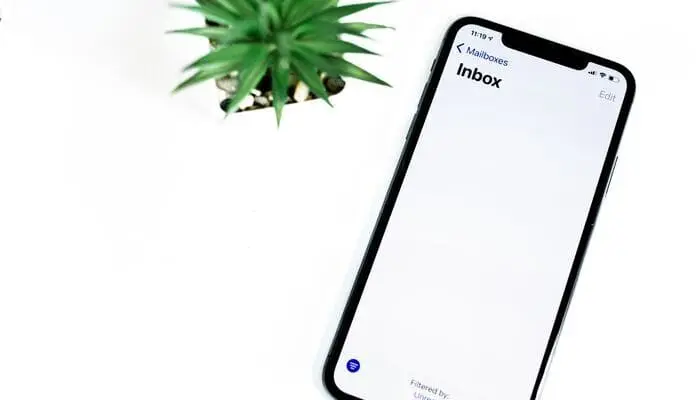Let’s talk about how to write email subject lines that actually get attention.
If there’s one thing that sales professionals don’t spend enough time on, it’s understanding email marketing. Now I know what you’re thinking, “Shawn, I’m in sales. I don’t market.”
Okay, that’s fair. But,
- Do you send emails to prospects? (Yeah.)
- And, do you use those emails to try and get meetings, to try and get calls, and to follow up on open proposals? (Yeah.)
So isn’t it important that you understand the strategies that marketing would use to ensure that people,
a. open your email and
b. respond to your email?
That’s the whole goal!
Let’s get into it.
How to Write an Email Subject Line That Gets Attention (5 Tips)
Whether you’re new to sales or you’ve been around a while, you may have to change some habits that you’ve formed over the years.
There are different kinds of email subject lines. My goal in this video and post is just to give you a few strategies that you can test and apply.
Therein lies one of the first things I want to mention to you…
1. Note Email Subject Lines That Work (or Don’t Work)

(1:33)
When it comes to writing emails and email subject lines, you’ve got to do your own testing.
You’ve probably heard about marketing, talking about AB testing. What they’re doing is taking the same topic or theme and just trying some different things in both regards to determine what works better.
You need to do the same thing.
So, if you have an email that you send to somebody and it works, they respond quickly. Ask yourself,
- Was there something different about the title?
- Was there something different about the format, or the structure of this email that made it work well?
And, if you think there is, replicate it. Try it again. When you do that, you land on what’s working well with your prospects to get them to open and respond to your emails.
You kind of have to track your own best practices here by doing some testing yourself.
So let’s start there as a baseline.
2. Brief Subject Lines Are Better

(2:20)
Now with that in place, when it comes to subject lines, brief is key.
So when it comes to knowing how to write email subject lines that get opened, a lot of times one word actually gets opened more so than a big, long formal sentence.
For example, let’s say you’ve provided a proposal to a client and then they’ve fallen off the face of the earth. You’ve tried to reach them multiple times, but nothing’s worked. Send them an email with the title “Confused”.
Now, if you can track opens, I almost guarantee you (I’m not going to provide a guarantee, but I can almost guarantee you) it’ll get opened because people see that and think confused.
- What do they mean by “confused”?
- Are they confused?
- Am I confused?
- What’s going on?
That’s what you want. Then they open the email. So sometimes one-word titles are all you need.
If you want to improve how to write email subject lines, ask yourself if you can create a one-word title here that’s provocative, to get people thinking and get them to open the email.
(3:15)
Now, I mentioned the one-word email title a minute ago, but here’s something else to consider. I don’t want you just to use one-word email titles that wouldn’t make sense, but here’s a rule you can apply:
Shorter is better.
Think about how your emails land on your phone, or in your inbox on your computer.
Even if you’ve got a reading panel off to the right or in your phone, the screen’s pretty small. You don’t always get to see the full title.
So you want to make sure you limit the number of characters in the title, so it can be read. If you want to test this, send yourself an email with the title and make sure that you can view it.
(3:50)
This is also why I’m not a fan of sending emails where you put somebody’s name in the title, it’s useless, and it’s wasting space.
Think about that email subject title, with the variability of screens, how it looks on different screens can change. So hence why I say test your own.
But what I want you to consider is that’s like prime real estate right there – that subject line. So we want to use it effectively, by being brief and to the point with that subject line.
If it’s wordy, if it’s verbose, or if it’s just too broad, people just tend to dismiss it because they can’t read the whole thing in some cases, so it has no meaning to them, therefore, they’re not enticed to open it.
The next strategy I want you to consider in how to write email subject lines is to use question marks.
3. Use Question Marks in Your Email Subject Lines

(4:33)
Now, don’t always use question marks, right? The goal in using emails that are effective, again, we’ve talked about making sure the subject line, you can try those one words, subject lines.
The next strategy I want you to consider in your email subject line is asking questions.
So rather than use the subject line to provide a summary or a title of whatever your email’s about, ask your prospect a question.
- Is this of interest to you?
- Would you like to attend?
- Did you receive the proposal?
Create a short question with a question mark behind, and use that as your email subject title.
Now, there should still be some content in the email, but the goal in that subject line again, is to get them to click open and respond.
If you bury your question in the content, a lot of times it won’t get read. They won’t get that far because they won’t open it.
So try putting your brief question with question mark in the subject line, and you might find that that actually gets you the response you’re looking for.
4. Write the Subject Line Last

(05:17)
Here’s another strategy that I don’t find a lot of people talk about. Even in the marketing world, when it comes to email subject lines, you want to make sure that you write the subject line last.
I’m going to say that again. You want to make sure you write the subject line last.
You might be saying, that doesn’t make sense. I write left to right, I go from top to bottom. That’s fair.
But, if the subject line is the most important piece or component of your email, (which if you haven’t picked up on that so far, it is!) What I want you to do is consider putting that content together, and then writing your subject line. You’re going to be in a better mind space after writing the content of the email as to
- what is the best question to ask here, or
- what is the question I’m looking for a response to, or
- what is that one word that’s really going to drive home this message?
You see, you want to make sure that that subject line aligns with the content, but is designed as we’ve been talking about in a way that gets your prospect or buyer to open the email.
So try writing the subject line last. You might find it comes easier to you as to what is the best approach or strategy to use.
5. Know What Elicits Your Audience’s Response

This last tip for you? Something I mentioned earlier, but it’s important to bring it back up when it comes to email marketing.
Whether you’re in B2B sales or B2C sales, you’re selling different things from widgets to insurance, to software, you name it. So the people you’re selling to, their titles, their rules, their positions, their authority can change. How you write an email to a CEO, for example, is different from how you write an email to an IT manager, a supervisor, or an HR professional.
(6:58)
There are different nuances in those individuals in their skills and their titles and their priorities that you need to encapsulate in your emails.
However, there’s one common thing that you can do to ensure that you continue to have effective emails that get open and responded to, and that is AB testing.
Now, I’ve referenced this before, you’ve probably heard of this in the marketing world, but it’s as simple as this:
If I’m sending an email to several people, all of a similar title, and it’s a similar email, the content is similar, I want you to try different subject lines: change ’em up:
- use one word on one,
- use a short phrase on another, and
- maybe a question on the other.
See which one gets opened first. Which one gets opened repeatedly and which one gets the fastest response.
In doing so, you’re creating your own testing. Once you land on, wow, this question one really worked well, the next time you send that similar email to a prospect or a buyer, use the same title and see what happens.
(7:53)
That’s how we start to test our own best practices.
You see, many of us look at email as just, I’m sending information your way. We don’t put any real thought into the structure, particularly the subject line, which is the most important part.
You’ve got to be willing to do some of your own testing to identify what is the best subject line I can use here that gets the fastest response, gets me what I’m looking for. Then, replicate that to validate. And now you’re onto something.
Now you’ve got your own best practice you can use repeatedly because you know it works, and when it stops working, it’s time to go back to the drawing board and change things up again. You see what people pay attention to changes over time.
We need to evolve and change ourselves.
AB testing is key, or ABC testing, whatever you want to call it, is key to ensuring we always have effective subject lines that get opened and responded to.
I hope you enjoyed this post and video about how to write email subject lines. There are lots of other videos that you can check out my YouTube channel.

© Shawn Casemore 2023. All Rights Reserved.

Share This Article
Choose Your Platform: Facebook Twitter Google Plus Linkedin